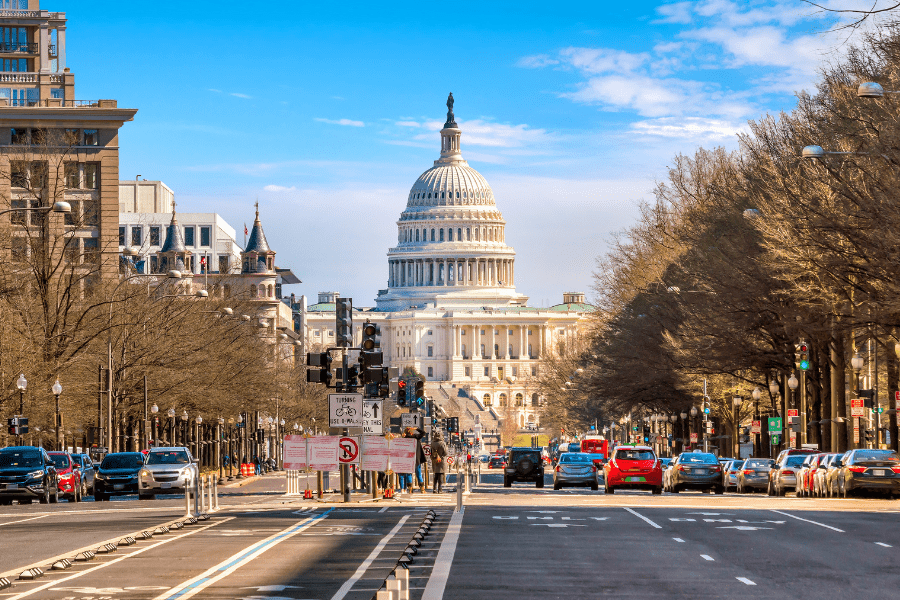Doing Business in the US in 2025: What Entrepreneurs Should Know
February 10, 2025
What’s better – holding a job or owning a business?
Historically, many arguments have been made in favour of each side, but the verdict almost always boils down to one statement: it depends.
While a business may offer you exceptional freedom and flexibility, you’ll also have to manage a fair share of risks and liabilities.
On the other hand, a job may provide you with a fixed monthly income but little to no control over your hours, workload or future.
Still, regardless of the pros and cons of each side, many people dream of having a business of their own.
That’s because starting a business gives you a chance to create something, build a legacy and live a life of freedom, doing what you truly want.
It’s not for everyone: Some people don’t have the necessary skills, the means or the temperament to set up and manage business operations, while others are more than happy with their day-to-day jobs.
If you are one of these ‘happy’ employees, then good for you, but at the same time, the ground realities cannot be ignored.
The biggest argument in favour of a job is its ‘stability’ and a ‘secure’ monthly income, but is it that safe and secure?
According to the World Economic Forum, in 2020, 114 million people lost their jobs due to the pandemic and the resulting lockdown.
Since then, unemployment has hardly improved, with the number of monthly job losses in the US steadily on the rise.
In fact, the unemployment rate in the US rose to 4.2% at the end of 2024 – a sign that the job market isn’t necessarily improving.
Over the past four years, business owners have had to choose between keeping their employees and staying afloat. Logically, they chose themselves.
When push came to shove, the employees who weren’t considered ‘essential’ were the first to take the hit from a global pandemic and the economic nightmare that followed.
That alone is enough to show the fragility of employment.
If you learned your lesson from the pandemic and want to be your own boss, congrats – you’re already ahead of many people who are still afraid to make that leap.
Wondering what’s next?
The most important part is to find the best business idea and work on it.
But to find the best business idea, you need to ask yourself the following questions:
- Do I want to set up a local business?
- If not, do I know what the best countries in the world for doing business overseas are?
- Can I even afford to do business abroad?
- Will I be hiring overseas, or is it better to stick to the local talent?
- Do I need to hire at all?
Were you surprised by the overseas option on our list? You’re not alone.
When setting up a business, you’ll find tons of relevant materials online, but when it comes to offshore companies, you’ll find that the amount is far smaller.
That’s because many people don’t even consider the offshore option, which, quite frankly, is a shame.
Setting up an offshore company could be the very thing that sets you apart from your peers.
But even if you want to run a business in another country, where do you start? Most importantly, which country should you choose?
Which Country Should You Choose to Start a Business?
This isn’t the ‘80s or ‘90s anymore when having a business in the US or some European country meant that you had made it big in the world.
In this day and age, countries are competing for your business.
For high-net-worth entrepreneurs, the world is like a buffet table; there are plenty of options to choose from. One country could be tax-free while another one could offer a high quality of life that you’re used to.
Similarly, one country may give you tax exemptions for setting up a company, while the other may make you liable for huge taxes by doing the same thing.
There is no one-size-fits-all formula when selecting the perfect country to start a business.
Perfection is a pretty subjective concept, and what works for one may not work for another.
Here at Nomad Capitalist, we have always said that there is no ‘best’ country.
Some countries can be the best at certain things, but no country can be the best at all things. That’s why we have always encouraged people to go where they’re treated best.
Observe a country from a client’s perspective, not a potential citizen’s, and you’ll see how it falls into your plans.
Getting citizenship is not always the answer; sometimes, establishing a second residence does the job.
At other times, you might not even need a residence – it all depends on what you want.
Now that you know it’s not about choosing the objectively ‘best’ country but instead focusing on what you need from a country, let’s talk about doing business in the US.
Should You Be Doing Business in the US?
Even in 2025, people get so wrapped up in their pursuit of setting up a business in the US that they forget to consider the most critical question: Should they even be doing business in the US?
Well, they’re not entirely at fault.
The social media we consume, the movies we watch and the stories we’ve heard all point to the US as a land of opportunity where you can come from anywhere and make it big if you’ve got what it takes.
And who hasn’t heard of the American dream?
But is that all genuine or just sweet nostalgia for the past halcyon days, when businesses were booming and profits were soaring?
Compared to the ‘80s and the ‘90s, today’s US is not as business-friendly as people, especially foreigners, may think.
The US government appears to be on a spree to bring as many people under its fold as possible through a rigid tax system and regulatory policies.
But is it all doom and gloom?
Not at all.
The US can be an exceptional place to start a business, but it heavily depends on the type of business you’re planning to run.
Doing Business in the US – What Not to Do?
As we mentioned before, no country is perfect as a business jurisdiction.
The success and sustainability of a business in any country depend on several constantly changing factors.
One of those factors is the kind of business you’re into.
Below, we’ll briefly discuss some of the best and the worst businesses to start in the US and why they are deemed so.
The Best Businesses to Start in the US

If you’re set on doing business in the US, the best business categories include:
- Online consultation services
- App development
- Virtual book-keeping
- Digital marketing
- Freelancing through other digital services.
These are just a few examples, but the crucial thing they all share is that they can be done entirely remotely and independently.
In 2025, starting a location-independent online business can prove to be one of your safest bets.
Not all online businesses are equal. Some can have a growing market with a high demand, while others don’t. Hence, they can’t be judged the same.
But overall, owning a mobile business makes perfect sense in an increasingly mobile world.
Moreover, if you don’t plan to live or hire in the US at all, you can structure your US business to be tax-free in the United States with an LLC structure.
An LLC structure is especially attractive to US non-residents and people who plan to renounce their US citizenship yet want a business in the United States.
Of course, many factors must be considered, but with intelligent tax planning, you can run a business in the United States without worrying about the resulting tax burden.
Worst Businesses to Start in the US

If a location-independent business is your best bet, then what should you avoid? We believe the worst business types to start in the US include:
- Restaurants
- Nightclubs
- Limo Services
- Salons
- Malls.
This list is by no means exhaustive and, truth be told, it barely scratches the surface.
However, one thing it does make clear is the type of business you should steer clear of in the US in 2025.
That type is any (on-site) service-based business, also known as a local business.
If you’re wondering why – read ahead.
Concerns about Doing Business in the US
The United States offers the world’s largest economy, and it’s known around the globe as the ‘land of opportunity’. So, why is doing business in the US often a bad idea?
Here are some of the main reasons and considerations to make before starting a business in the US.

Learn from the Pandemic
It may have been some years ago, but we can still learn important lessons from the Covid-19 pandemic.
The pandemic caught the entire world off guard. No one expected things to get as bad as they did.
At the start, when the US federal government announced that they were shutting things down for two weeks, all hell broke loose.
But, little did we know at the time that it was only the beginning of a long and stressful journey for US businesspeople.
The CARES Act
In March 2020, when the pandemic was barely in its infancy, the US Congress passed the Coronavirus Aid, Relief and Economic Security Act (CARES).
According to the US Department of Treasury, the CARES Act was designed to provide ‘fast and direct economic assistance’ for people in the US.
But is that what happened?
If you owned a rental property in the US during the pandemic, your answer would probably be, ‘no’. If you didn’t, here’s what actually happened.
The CARES Act included an eviction moratorium that prohibited landlords from evicting tenants if they failed to pay rent.
The eviction moratorium wasn’t for all rental properties; it was only applied until July 2020, and certain conditions had to be met.
Still, many landlords found themselves in a financial crisis, on top of the global one, all thanks to a government Act called CARES of all things. The irony here is impressive.
But that’s not all. The real woes began when the CDC started rolling out similar regulations.
CDC-Issued Eviction Moratorium
If you don’t know already, CDC stands for Centers for Disease Control and Prevention.
The department is pretty straightforward and usually deals with, as the name indicates, disease control and all associated issues.
However, during the pandemic, the CDC did something many would argue far above its designated role. It issued a long-term eviction moratorium.
The eviction order ended on August 26, 2021, after a Supreme Court ruling, but not before it put a lot of people out of business.
The government and the CDC argued that the moratorium was issued to help regular American folks and small businesses in an economic fallout due to the pandemic. Still, it had the almost opposite effect on many business owners.
In essence, the US government has shown how easily it can put people out of business if it thinks it’s the right move.
It shouldn’t be rocket science to figure out that if it’s done it once, it can easily do it again – pandemic or not.
Should you stick around for that and take your chances? We don’t think so.
Ever-Increasing Taxes
How much tax is too much tax? In the US, it seems that there is no such thing as ‘too much tax’.
You’ll find taxes on everything from your income to estate, and every government seems to love the idea of a tax raise.
This is a significant roadblock for aspiring investors or entrepreneurs when setting up a business.
There’s no doubt why territories like the Cayman Islands, among other tax havens with no income taxes and corporate taxes, are so popular with high-net-worth individuals.
Tax-friendly countries offer a chance to keep more of what you earn, and people love that – rightfully so.
Go Big or Go Home
The US loves ‘big’ – ‘big government’, ‘big labour’ (unions), ‘big business’ and so on.
This movement toward ‘big’ entities is a major problem for small business owners looking to make their mark in the US.
During the pandemic, some big box stores could sell a particular item, but small local stores were prohibited from selling the same thing. Does that seem fair to you?
The US government even operates a site called Small Business Administration, which provides helpful guides and other resources for aspiring entrepreneurs to explore opportunities. But nowhere will you find any mention of this bias against small business owners.
If you have a global business or if you own multinational companies, things may be easier for you since you would have enough capital to control certain factors that are uncontrollable for under-capitalised small business owners.
In essence, being small in the US will be a big problem for you.
High Operating Costs
Running a business in the US is expensive.
You’ve got high labour costs driven by federal and state minimum wage laws. And with union influence in some industries, your payroll expenses can be seriously inflated.
On top of this, healthcare and insurance premiums, combined with the complex taxation system, can seriously stretch your operational budget – especially for smaller businesses.
This is another reason why running a location-independent business is a good idea, as you can cut down on many of these high operational costs by finding employees offshore.
Immigration Challenges
Navigating the US’s immigration laws can be daunting for businesses looking to recruit international talent.
Getting your hands on a work visa can be time-consuming and expensive. For many companies, exploring remote work solutions becomes necessary to get over these recruitment hurdles.
Legal Risks
If you run a business within the US legal environment, be prepared for lawsuits. The potential for lawsuits in the US ranges from product liability to employment disputes and everything in between.
Staying compliant with the many regulations and having proactive legal strategies in place, including holding enough insurance, is essential.
Even still, legal risks can be a big concern for small businesses.
The last thing you want is to be worrying about potential liabilities instead of focusing on your core operations.
Advantages of Doing Business in the United States
While doing business in the US comes with its challenges, it’s still a land of opportunity. Here are some reasons why running a business in the US could be a good idea.
Generally Business-Friendly Environment
In the latest World Bank ‘Doing Business’ report, the US is ranked sixth for ease of business.
The report was put together after tons of market research and a thorough analysis of a country’s business environment, import tariffs and the general economy.
So, there is no doubt that the US is still pretty attractive for certain businesses.
The diverse market, the ‘first-world’ persona, and copyright laws in the US can be your best allies in setting up a business, but like every decision in your life, you have to be smart about it.
Growth Potential
The US economy, with a GDP of approximately US$27.36 trillion, is still the largest in the world, so technically it offers unmatched opportunities for growth.
Entrepreneurs here can benefit from cutting-edge innovation, extensive resources and access to large amounts of venture capital. After all, most of the world’s biggest businesses are based in the US for a reason.
This dynamic environment creates an ideal environment for scalability. Businesses can evolve rapidly and penetrate diverse industries.
Large, Stable and Wealthy Market
With nearly 340 million residents and a high per capita income, the US represents a vast, affluent consumer base.
Businesses have a big platform from which to expand and thrive. So, despite the country’s challenges, there are still vast market opportunities.

Doing Business in the US: FAQs
The exact steps will depend on the type of business you start. However, you can expect to have to register your business, get an employer identification and open a business bank account, among other steps.
The federal corporate tax is 21%, although you may have to pay taxes at the state level as well.
Foreigners can start a business in the United States provided they have a visa that allows them to work or engage in business activities.
The United States can be a good place to do business, although entrepreneurs can also thrive by launching a business in a country with lower taxes and less stringent regulations.
The answer depends on several factors, although we’d generally recommend looking for places with relaxed business regulations and low business taxes. With that in mind, Texas, Florida and Nevada are examples of business-friendly states.
Costs vary depending on the type of business you want to launch, but you will often have to pay registration fees, as well as for licences and permits and business taxes.
Yes, foreign companies can absolutely do business in the US. They typically set up a local branch, establish an LLC or incorporate in a US state. Of course, this requires plenty of compliance with US laws, as well as sticking to US tax requirements.
Canadian companies can operate in the US with minimal red tape. They often use trade agreements like the United States–Mexico–Canada Agreement (USMCA) to simplify cross-border trade or establish a subsidiary for direct operations.
Foreigners start businesses in the US by forming a legal entity like an LLC or corporation. They need an Employer Identification Number (EIN) and may require specific visas, such as an E-2 Investor Visa.
The US offers a large, affluent consumer market, access to plenty of capital and a generally business-friendly environment. Its strong legal framework provides protection for intellectual property and innovation.
The Future of Doing Business in the US
Different countries offer different benefits when it comes to starting a business. Instead of considering a country for every good thing that it provides to everyone, assess it for what it offers you.
Think about your business needs and then see if the ‘popular’ country offers that. If it doesn’t, all the popularity in the world won’t matter.
If you have the will and the right plan to face all the issues that come with starting a business in the US, by all means, go ahead.
But if the US is not a good option for you, don’t lose heart. There are many countries out there competing for your business.
All you have to do is reach out, and we’ll help you select a place where you and your business will be treated best.



How to Get UAE Citizenship – The Complete Guide
Sovereignty – both national and personal – shapes ambition, secures wealth, and defines status in a shifting global order. For the high-achieving global citizen, acquiring a second or even third passport is more than a lifestyle upgrade; it’s a strategic move in long-term financial and geopolitical positioning. But not all citizenships are created equal – […]
Read more

A Gateway to Central Asia: New Kazakhstan Golden Visa Program for 2025
Central Asia just raised the stakes in the golden visa game. In May 2025, Kazakhstan officially launched a 10-year Golden Visa program in an ambitious move to position the country as a serious contender in the global investor migration space. At a time when other international regions are rolling back their citizenship and residency options, […]
Read more

Top Countries Offering Golden Visas in 2025
Residency is no longer about lifestyle – it’s about leverage In an increasingly unpredictable world, Golden Visas offer something most governments can’t: certainty in exchange for capital. They are more than migration tools; they are strategic safeguards offering residence rights, future citizenship, global mobility, and access to tax-friendly jurisdictions. For investors, entrepreneurs and globally minded […]
Read more





